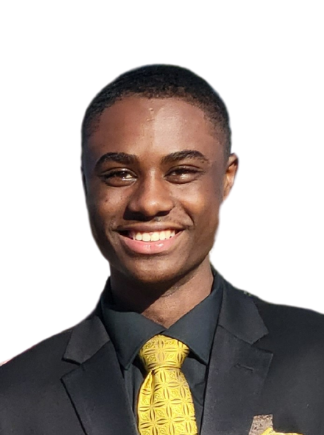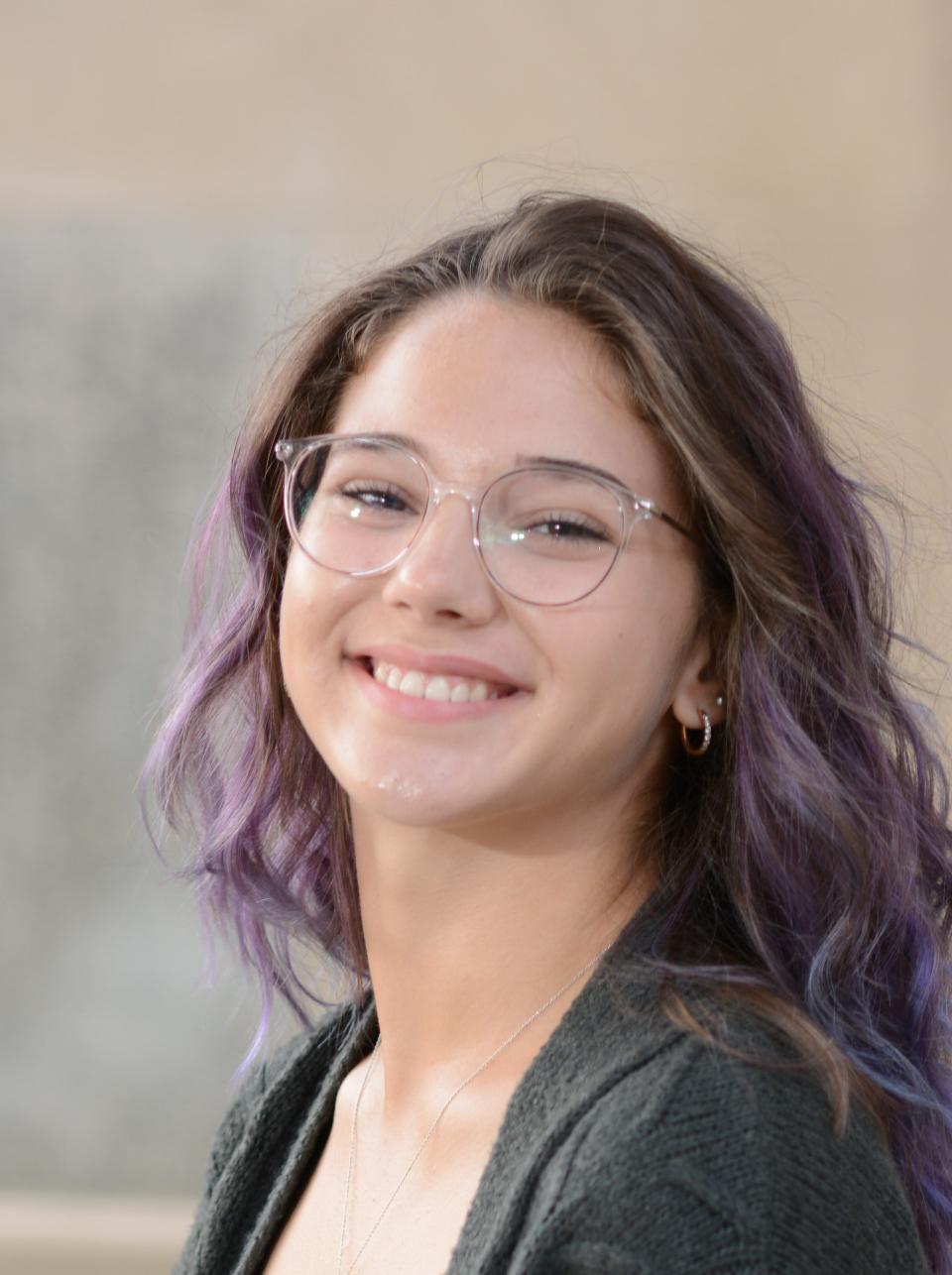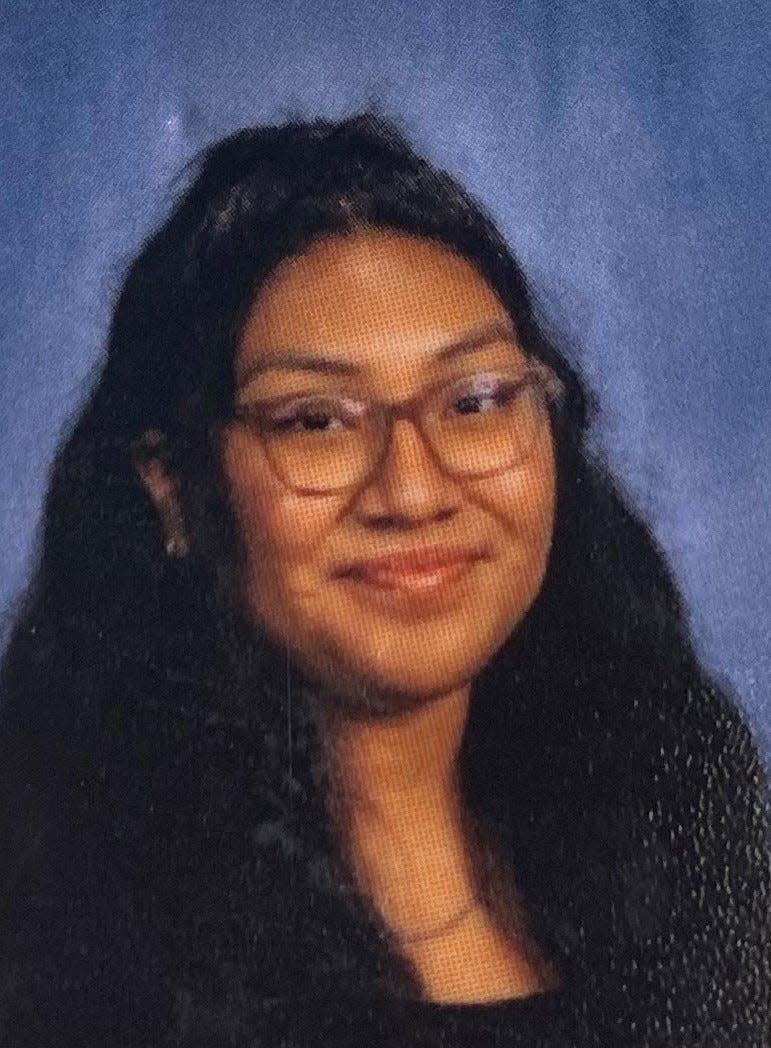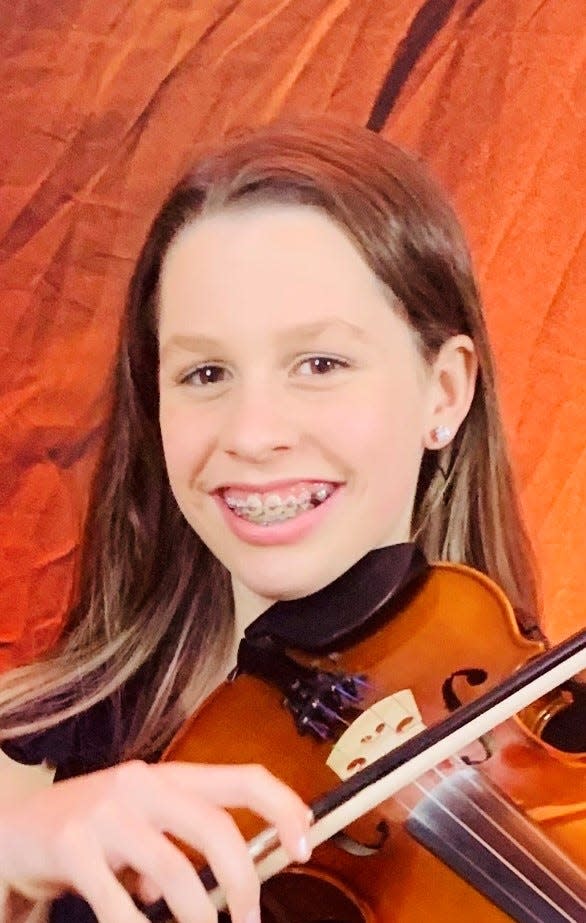Greater Lansing students find personal meaning in the words of Martin Luther King Jr.
- Oops!Something went wrong.Please try again later.
The Dr. Martin Luther King Commission of Mid-Michigan held it's annual essay contest for Greater Lansing junior and high school students, including the Mark S. McDaniel Legacy Scholarship component for graduating seniors.
Scholarship winners (two) will receive $5,000 prizes; three other finalists will receive $2,500 prizes. Essay contest winners receive $500 for first place, $350 for second place and $150 for third place.
This year's theme is the Martin Luther King Jr. quote, "In the long run, justice finally must spring from a new moral climate.” Below are scholarship and essay contest winners.
You can still watch the day of celebration from the Dr. Martin Luther King, Jr. Commission of Mid-Michigan, to learn more about the event visit mlkmidmichigan.com/day-of-celebration.
Scholarship contest winners
Co-winner: David Ferguson, East Lansing High School
Co-winner:James McCurtis, Okemos High School
Finalist: Jerry Jai Kozar-Lewis, East Lansing High School
Finalist: Kalib Jackson, Eastern High School
Finalist: Eliana McDonald, Eastern High School
(scroll down for essays)
Essay contest winners
First place: Xavier McKissic, Everett High School
Second place: Sophia Liu, Chippewa Middle School
Third place (tie): Diana Carrosco-Guerrero, Sexton High School
Third place (tie): Emma Heinzelmann, Chippewa Middle School
(scroll down for essays)
Scholarship contest winners
Co-winner: David Ferguson

"In the long run, justice finally must spring from a new moral climate" means various things to many different people. Everyone is unique, one-of-a-kind, and individual. But it is through community that our society can thrive as a whole.
In 2020, I participated in the NAACP Youth Rally Protest. What led me to this was the disappointment and sadness of injustice in America. What happened to George Floyd was unacceptable and I felt that marching would show that the malpractice of justice was not admissible. My family and I agreed to exercise our First Amendment right to fight injustice. I did had some fear for my safety and as well as for my family. Lansing was a victim of rioters while protesters were exercising their First Amendment rights.
I felt like I was a young John Lewis trying to turn injustice into a peaceful moral climate. My Edmund Pettus Bridge was Michigan Avenue. I learned that protest and outcry could cause a massive influence on the trajectory of a new moral environment. At the rally, everyone agreed on one thing. Regardless of race, gender, or economic status, we all decided that what happened to George Floyd was not just. My experience at the rally is an example of the push needed to spring towards justice.
I believe absolute justice is obtainable, and the first steps start with everyone. With any goal, there has to be a definite drive to achieve. Dr. King once said. "Faith is the first step even when you don't see the whole staircase." Martin Luther King Jr. knew that faith in his efforts would produce fruits of success.
I find it quite ludicrous that we are still dealing with problems that have grown roots since 1619. A significant part of the problem is laziness in society. The lack of empowerment and honest assessment of situations that developed into a basket of secondary dilemmas. This includes gang violence, immaturity, politics, generational divides, economic status, and the lack of diversity and inclusion.
With Dr. King's philosophy, I am confident that I can achieve my goals of educating others on financial literacy. My dream is to build an educational institution teaching kids about financial literacy and coding. This is how I will make my difference towards a new moral climate. As we come together and put our differences to rest, we shall overcome the problems of our day.
David Ferguson (East Lansing High School)
Co-winner: James McCurtis

The crowd outside on this warm June day was bustling, but there was an absence of life. I could tell from the podium at the former Black Child and Family Institute that they were anxious. The tensions were high because the recent deaths of Ahmaud Arbery, Breonna Taylor and George Floyd had shaken everyone. They stared intently at me, waiting for me to begin. I knew they saw me standing there, but I hoped they wouldn't see me; a nervous Black 15-year-old at the Lansing Coalition Juneteenth Public Forum last year. I was tasked with delivering a three-minute speech to hundreds of people — including newscasters and politicians — about social injustice and police brutality. But Dr. King said "in the long run, justice finally must spring from a new moral climate," and this was my chance to bring forth such change.
I scanned the audience and began talking about the importance of voting. Throughout my entire life, I heard people complain about how a certain president was elected or why a bad policy was implemented. Ironically, they were the same people who never went to the polls to voice their opinion through the ballot. The ballot is our strongest weapon, and we need to use it because we we could be the loudest in the room. If we don't vote, our opinion won't matter. We must vote nationally and locally to elect our mayors, judges and prosecutors in the hopes of unleashing a new moral climate that birthed the justice that found a police officer guilty of murdering Mr. Floyd and three men guilty of killing Mr. Arbery. Voting isn't the only way to make an impact.
We can serve our community and work with our political leaders to effect change. I talked about the need for young people to educate ourselves on our rights so we wouldn't be taken advantage of. We must work with our politicians to implement a policy that would make it a right for 16-to 18-year-olds to call their parents when pulled over by the police to help provide safety and comfort. Subsequently, I served on Rep. Sarah Anthony's Youth Advisory Council and she would later introduce my idea as a bill in the state Legislature.
Once I finished my speech, a massive weight had been lifted off my chest. I felt alleviated being able to speak what had been on my mind for the last few months, and to my surprise, I could tell the crowd felt the same way as well. A semblance of that life had returned. The nervous kid inspired by Dr. King's teachings, was met with an overwhelming applause. I couldn't contain my smile.
James McCurtis (Okemos High School)
Finalist: Jerry Jai Kozar-Lewis

"Standing in Solidarity"
Dr. Martin Luther King Jr. once said, “In the long run, justice finally must spring from a new moral climate.” This statement was in response to the 1957 desegregation of Central High School in Little Rock, Arkansas. However, his words remain important and relevant today, especially with the murders of George Floyd, Breonna Taylor and many others who have been victims of police violence. As a young Black man, my family and I have been affected by these tragedies. Understanding that I may be perceived as a threat because of my skin color means I cannot run in certain neighborhoods when it gets dark. It means I need to be extra cautious when I am driving or have my music too loud. It means I need to understand that violence can find me when I least expect it. This is why we protest.
It is amazing to see the support from communities that came together to protest these injustices. I was proud to attend a protest at the Michigan state Capitol in downtown Lansing. Unfortunately, I notice how quickly people forget about these tragedies and move on. After a couple of weeks, once people felt that they did their part, they stopped protesting and stopped supporting our cause.
I am also a young Asian man. I have seen the attitudes towards Asians and the hate that we have received due to the coronavirus. We have been victims of racism, hate, and violence due to the pandemic. Again, there was a flood of support from communities until people lost interest and moved on.
The current moral climate involves a lot of performative activisms, and it is disingenuous to fight injustice only when it is trending. Our temporary moral compass needs to be fixed and become a constant part of our life. My biracial identity has given me a different view on issues knowing that it is crucial that people support all injustices. It is not Black vs Asian vs white vs Latino. It is not us vs them. We need to work together and stand in solidarity with each other consistently to correct injustices in the world. We need to always continue in our fight for equality, not just when it is convenient.
Jerry Jai Kozar-Lewis (East Lansing High School)
Finalist: Kalib Jackson

Dr. Martin Luther King, Jr. was a very influential person during his time on earth and even now, he still is in this day and age, which to most people speaks volumes because he's been deceased for 53 years now. The words he spoke are still being spoken by everyone regardless of beliefs because that's the type of influence he had.
A quote from him says that, “In the long run, justice finally must spring from a new moral climate." Yet spiritual forces cannot emerge in a situation of mob violence." Martin was speaking about then President Eisenhower calling "wishy-washy” for not being on one side or the other. Moreover, in Martin saying these words, he's saying that to get that justice or that end goal you have to change for the better, change your way of thinking and think about what may ensue after. Turn that leaf that you've thought might never get flipped.
Justice for the future is essential because for a nation that has a pledge calling for allegiance which also at the end states, “indivisible, with liberty and justice for all.” But in an environment where it has no justice it always results in no peace until that justice is served righteously. Though in this world people around can be seen transitioning into that new moral climate that King brought when he addressed Eisenhower's action ways of trying to serve equality in the place in of where justice should be upheld equally the most; schools. Furthermore with his statement you can't present violence to achieve your self image of justice and try to justify your actions with the words of your god equally looking as someone that lacks internal moral justification.
Kalib Jackson (Eastern High School)
Finalist: Eliana McDonald

Dr. Martin Luther King Jr. once said “In the long run, justice finally must spring from a new moral climate," I believe this means that in order for justice to be achieved, you must first convince the majority of the public to adopt a new mindset. This could mean a new generations mindset perhaps.
To understand Martin Luther King Jr.'s statement, you must first understand the definition of the word “moral,” which is defined as "concerning or relating to what is right and wrong in human behavior," and the word "climate, which is defined as "the usual or most widespread mood or conditions in a place.” When combining the two, to me, the phrase "moral climate" means: The most widespread belief of what is right or wrong.
It almost irks me to know that this quote was written in 1957 in reference to the treatment towards people of color during the civil rights movement, yet it is still relevant today. Things like the Black Lives Matter movement, the push for something to be done about climate change, the abortion rights movement, and the need for LGBTQ rights. There are likely more issues that Dr. King Jr.'s quote applies to, but these are just the few that come to mind.
I also believe the kind of people that are concerned with these issues prove his point as well. A series of telephone interviews from 2015-2018 from people ages 18 and up gathered data that 70% of people ages 18-34 are worried about global warming while only 56% of people ages 55 and older are worried about it. We needed a generation that would provide a new "moral climate" to see some activism regarding the issue of climate change. The same applies with the Black Lives Matter movement, which more directly applies to the theme of justice; “Two-thirds of adults younger than 30 express at least some support, as does a narrower majority of those ages 30 to 49 (58%). About half of adults ages 50 to 64 (49%) and 46% of those 65 and older say they support the movement.
This research just goes to show that the very thing that Martin Luther King Jr. was fighting for almost 70 years ago is still relevant today. We still need strong people to influence the moral climate to allow justice and from the looks of it, the people that will influence the morals will be this new generation.
Eliana McDonald (Eastern High School)
Essay contest winners
First place: Xavier McKissic

"In the long run, justice finally must spring from a new moral climate.” — Martin Luther King Jr.
Black children are misled and misunderstood by outside forces everyday. With generational curses and childhood trauma dating back to their first breath, they have little to no education on how to process strong feelings — causing minor inconveniences to pile up on each other. Meaning that when problems occur, they have no way to express their feelings other than anger. Trauma, mixed with firearms makes Black children seem violent as opposed to misunderstood. Lack of resources results in the consistency of Black poverty — ensuing in the abundance of gun violence in our society.
The education system is built to break upon the same people it claims to attend to. For Black people, there are very few chances to break out of the generational cycle of poverty. In predominantly urban areas, there are very few opportunities for success. People that make it out of the cycle are considered extremely lucky, which says something about this environment as a whole. There are issues greater than the ones I've stated, but they also have solutions larger than I can comprehend. How do you change the mind of someone so fixated on hatred? How do you convince someone to change their beliefs of hostility towards a group of people? The answer lies in the future.
Once the human mind decides on a set of beliefs, it's nearly impossible to change them, meaning the solution lies in the generation ahead of ourselves. A better environment for the next generation would consist of counseling, emotional advocacy, and justice for the countless lives and futures lost to gun violence. My hope is that the new moral climate of justice for my people, lies in my generation and the ones to come.
Xavier McKissic, 7th grade (Everett High School)
Second place: Sophia Liu
"A Struggle for Justice"

For my 9th birthday present, my sister gifted me a book. I devoured it. The book was called "Separate Is Never Equal," a biography both authored and illustrated by Duncan Tonatiuh, detailing Sylvia Mendez and her family's fight for desegregation in California schools. And oh, my word, the writing! The art! It was so gripping and powerful —helplessly enthralling in fractured beauty.
The book tells the story of Sylvia Mendez's parents demanding the authorities give an explanation after their children of Mexican descent were denied the same education and opportunities as children of white backgrounds. They received none satisfactory, however, and soon brought their plight to court. Though the journey was difficult, the Mendez family emerged victorious: garnering support from students and parents who had suffered similar injustices, receiving help from associations of different backgrounds — all to eventually secure the rights for children of every ethnicity, language, and background to learn together in California schools.
I was reminded of "Separate Is Never Equal" when I was considering how to weave the theme for the contest into my writing. For Sylvia Mendez and so many others at the time, justice came in the form of living on equal footing with their white neighbors. However, if this was justice, why was it not established early on? Why only now? Of course, as Martin Luther King Jr. stated, perhaps the moral climate was simply not right.
Like a desert flower sunk under scintillating snow, justice can't establish itself when society's worldviews don't accept it. Nonetheless, there is hope. The snow will thaw, the desert flower blossom, and people living under injustice like Sylvia Mendez and millions of others at the time and at the present will eventually triumph in their battles for liberation, per Mr. King's famous words.
Sophia Liu, 8th grade (Chippewa Middle School)
Third place (tie): Diana Carrosco-Guerrero

Throughout history, justice has always been difficult to obtain. In some cases people have lost hope that one day there will be equality for everyone. Justice is a principle that every person, community, and culture deserves. Dr. Martin Luther King was a beacon of light showing us how to change the moral climate by increasing awareness and protesting against injustice.
MLK was conveying a deeply resounding message when stating these words: “In the long run, justice finally must spring from a new moral climate.” He believed that later on in time, there would be a generation that would emphasize the importance of justice and what it truly means. During the time Martin said these words, there was a lot of injustice specifically to those with another skin color and diverse ethnicities. Despite the lack of equity, MLK always saw the light at the end of the tunnel. He never gave up on his hope that one day people of color would gain justice.
In our present time, the world still isn't perfect, and it may never be. We still see people fighting for all sorts of justice, but the question that persist is: What can I/we do to contribute to the goodness of our society? We can start by always treating people nicely, gently, and respectfully. Each person has a challenge, an obstacle to face, and a hindrance that limits possibilities but we can all make attempts at understanding because we never know what someone is going through. We can initiate and support a moral climate change by not looking down on a certain community of people and by speaking up for the weak and the vulnerable. Giving equal and equitable opportunities no matter of background, religion, ethnicity, and culture is what will help us heal and advance the call for justice and pursuit of happiness.
Every little simple gesture of kindness, acceptance, tolerance, and perseverance paves the way for a better future. One that we aspire for ourselves, our families, and our communities. Everyone has their own opinions and beliefs, but one thing we should all do is strive to contribute to the equity and the freedom of living in a moral climate that celebrates our differences and enriches our unity bringing to fruition the dream that Martin Luther King Jr. Though it takes time, the arch of justice get served and in that is my hope for a prosperous future.
Diana Carrosco-Guerrero, 11th grade (Sexton High School)

Third place (tie): Emma Heinzelmann
Like how when you played the violin
a little too aggressively,
and the string snapped back hitting you in the face,
the same violin hidden forever in the corner of your basement.
The mortal race forever lost,
seeking out something that is never meant to be found.
For why would justice be found
in a garbage dump?
The quote said “must,"
Not “might," or” perhaps,” or “definitely not,”
It must spring out of the ashes, and shadows,
in order for justice to be found.
Like when you're looking for something,
but it's right there hidden in plain sight.
We must allow the pogo stick to be fixed,
start training to swim and run,
computer to be reprogrammed,
violin strings repaired,
Emma Heinzelmann, 8th grade (Chippewa Middle School)
Essay winners will be recognized LIVE at 7 p.m. on Monday, Jan. 17 airing locally on WILX TV-10 and WLNS TV-6, part of the day of celebration from the Dr. Martin Luther King, Jr. Commission of Mid-Michigan.
This article originally appeared on Lansing State Journal: Greater Lansing essay winners inspired by Dr. Martin Luther King, Jr.

